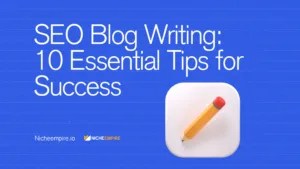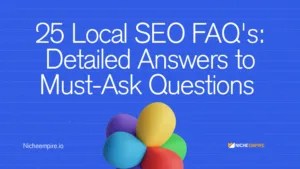SEO titles play a significant role in your website optimization, yet only a few pay attention to it and use it effectively.
Do you want to know how to Write the perfect SEO title that ranks your site and brings in more visits? Then this blog is the complete guide you need.
What are SEO Titles?
SEO titles are the words in the header of a page or the title tag in HTML. The SEO title, also known as the title tag, is the HTML element that provides the webpage title for search engines and browsers to display.
The SEO title tells Google and other search engines what the content of your website is all about.
Why are they important for SEO?
SEO titles are essential for several reasons, which include:
1. They determine the content type and search intent
They help search engines and users know what content they can find on your page.
2. SEO titles can affect rankings on search engines.
This happens because search engines like Google use SEO keywords in your titles to understand your page’s relevance to users’ queries. According to HubSpot, 75% of users never go past the first page of search results. So, you must consider the SEO title to rank on the first page.
3. SEO titles appear in search engines
They appear in search engine result pages (SERPs) as clickable links that drive traffic to your site from search results.
4. SEO titles appear in browser tabs
They tell a browser how to display the page title in tabs. With them in place, users can navigate to the correct page when multiple tabs are open.
5. SEO titles keep readers engaged and spend time on your page.
Having a great SEO title that aligns with search intent helps reduce bounce rates and encourages readers to stay on your page longer. If readers quickly find what they search for on your page, why won’t they stay? They will engage more with your page and click on other pages to learn about your site.
Best practices for writing the perfect SEO titles
Follow these best practices to write perfect SEO titles for the best results:
Include your target keywords in the title
Don’t just stuff your SEO titles with keywords; learn to include your primary keyword appropriately. Sometimes, you won’t be able to use your keywords as you wish. In this situation, you can often include a variant that satisfies the user’s query.
By positioning your keyword closer to the front of the title, search engines and users will quickly understand your content.
Write to meet user intent
Write for the user, not for search engines. Make sure your SEO title provides relevant information to your readers. It should be descriptive and relatable and solve their problem or proffer a solution.
Pay attention to length
According to Backlinko.com, title tags between 40 and 60 characters have the highest click-through rate. Try long sentences, but make sure to pay attention to length. Aim for a length between 50 and 60 characters. While your SEO title has no strict character limit, it will be cut off or truncated in SERPs if it is too long.
Being cut off in SERPs may confuse users and discourage them from clicking on your page.
If it is too short, you won’t be able to describe your content to your readers accurately.
Here are some techniques to keep your title brief and descriptive:
- Do not write in All Caps. Apart from being hard to read, they take up extra space and make your title too long.
- Where possible, use symbols to save more space.
- Include your brand name only when necessary.
- Separate with colons and pipes rather than dashes and hyphens.
Target a single primary Keyword
The best practice is to include only one target keyword in an SEO title. Stuffing more than one keyword into your title can lower your ranking.
Readers will also be confused, as they will not know the focus and may not even click on your page.
Write unique SEO titles for every page
Writing unique SEO titles for each page helps search engines know each page’s purpose and encourages readers to click.
Generic titles will not do justice to user queries or match their search intent.
Optimize your titles to increase click-through rates.
Make your SEO title so compelling that it can convince readers that your content is valuable.
When applicable, use phrases like “complete guide,” “step-by-step guide,” “free,” “(brackets),”etc. to let your readers know what your content provides.
Include words like how, why, and where to show your content when answering a question.
Common SEO Title Mistakes
When creating the perfect SEO titles for your page, you must watch out for common mistakes and avoid them.
Vague and unclear SEO titles
Your meta title tags must be descriptive enough for readers to quickly know what the page is about.
SEO title not relevant to the content
Your page will rank well on search engines if your SEO titles accurately reflect your content. Seize every opportunity to rank for a relevant keyword in your SEO title.
Using the same SEO title for multiple pages
Duplicating the same titles on different pages is not a good SEO practice. Unique titles make page differentiation much easier.
Outdated SEO titles
Regularly update your SEO titles to ensure they are current. For instance, an SEO title that has (current year) in it will look stale and outdated in (the following year).
Update time-sensitive content
A minor update to existing content’s SEO title can go a long way toward keeping your content fresh.
Conclusion
We have considered SEO titles, why they are essential, and how to write them perfectly.
Following these best practices and avoiding the above common mistakes can improve your website performance and increase organic visits.
Frequently Asked Questions
Where do seo titles appear?
SEO titles are displayed externally as clickable links in search engines and browser tabs to provide more information about the tab.
How long should a Seo title be?
SEO titles should be between 50 and 60 characters. This allows the entire title to be displayed in search engines. This is an industry best practice, though not a hard and fast rule.
Optimized tags are more neat and professional and give detailed information to users.
Can my H1 tag and SEO title be the same?
There are no penalties for using the same H1 tag and SEO title. However, since they serve different functions, it is recommended that they be different. This allows you to optimize each fully for its intended purpose. Learn more about blog titles and H1 in this post.



